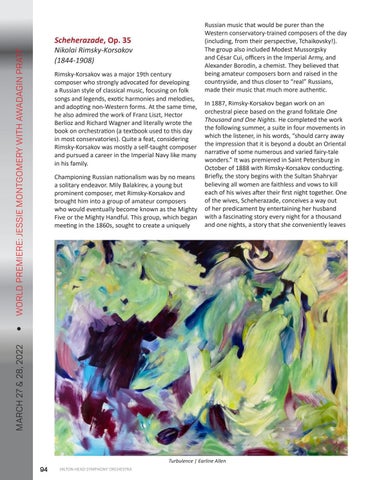Scheherazade, Op. 35
WORLD PREMIERE: JESSIE MONTGOMERY WITH AWADAGIN PRATT
Nikolai Rimsky-Korsakov (1844-1908) Rimsky-Korsakov was a major 19th century composer who strongly advocated for developing a Russian style of classical music, focusing on folk songs and legends, exotic harmonies and melodies, and adopting non-Western forms. At the same time, he also admired the work of Franz Liszt, Hector Berlioz and Richard Wagner and literally wrote the book on orchestration (a textbook used to this day in most conservatories). Quite a feat, considering Rimsky-Korsakov was mostly a self-taught composer and pursued a career in the Imperial Navy like many in his family.
MARCH 27 & 28, 2022
•
Championing Russian nationalism was by no means a solitary endeavor. Mily Balakirev, a young but prominent composer, met Rimsky-Korsakov and brought him into a group of amateur composers who would eventually become known as the Mighty Five or the Mighty Handful. This group, which began meeting in the 1860s, sought to create a uniquely
94
HILTON HEAD SYMPHONY ORCHESTRA
Russian music that would be purer than the Western conservatory-trained composers of the day (including, from their perspective, Tchaikovsky!). The group also included Modest Mussorgsky and César Cui, officers in the Imperial Army, and Alexander Borodin, a chemist. They believed that being amateur composers born and raised in the countryside, and thus closer to “real” Russians, made their music that much more authentic. In 1887, Rimsky-Korsakov began work on an orchestral piece based on the grand folktale One Thousand and One Nights. He completed the work the following summer, a suite in four movements in which the listener, in his words, “should carry away the impression that it is beyond a doubt an Oriental narrative of some numerous and varied fairy-tale wonders.” It was premiered in Saint Petersburg in October of 1888 with Rimsky-Korsakov conducting. Briefly, the story begins with the Sultan Shahryar believing all women are faithless and vows to kill each of his wives after their first night together. One of the wives, Scheherazade, conceives a way out of her predicament by entertaining her husband with a fascinating story every night for a thousand and one nights, a story that she conveniently leaves
































